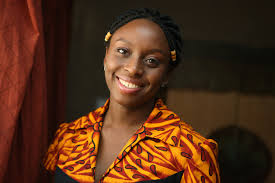Chimamanda Ngozi Adichie on Race


Chimamanda Ngozi Adichie on Race…”We all wish it was not. But it’s a lie. I came from a country where race was not an issue; I did not think of myself as black and I only became black when I came to America.”
Chimamanda Ngozi Adichie on Race
The only reason you say that race was not an issue is because you wish it was not. We all wish it was not. But it’s a lie. I came from a country where race was not an issue; I did not think of myself as black and I only became black when I came to America. When you are black in America and you fall in love with a white person, race doesn’t matter when you’re alone together because it’s just you and your love.
But the minute you step outside, race matters. But we don’t talk about it. We don’t even tell our white partners the small things that piss us off and the things we wish they understood better, because we’re worried they will say we’re overreacting, or we’re being too sensitive.
Placating liberal friends on race matters
And we don’t want them to say, Look how far we’ve come, just forty years ago it would have been illegal for us to even be a couple blah blah blah, because you know what we’re thinking when they say that? We’re thinking why the fuck should it ever have been illegal anyway? But we don’t say any of this stuff. We let it pile up inside our heads and when we come to nice liberal dinners like this, we say that race doesn’t matter because that’s what we’re supposed to say, to keep our nice liberal friends comfortable. It’s true. I speak from experience.”’
…a few notes from Wikipedia about race:
Race and colonialism
According to Smedley and Marks the European concept of “race”, along with many of the ideas now associated with the term, arose at the time of the scientific revolution, which introduced and privileged the study of natural kinds, and the age of European imperialism and colonization which established political relations between Europeans and peoples with distinct cultural and political traditions.[42][43] As Europeans encountered people from different parts of the world, they speculated about the physical, social, and cultural differences among various human groups. The rise of the Atlantic slave trade, which gradually displaced an earlier trade in slaves from throughout the world, created a further incentiveto categorize human groups in order to justify the subordination of African slaves.[44]Drawing on sources from classical antiquity and upon their own internal interactions – for example, the hostility between the English and Irish powerfully influenced early European thinking about the differences between people[45] – Europeans began to sort themselves and others into groups based on physical appearance, and to attribute to individuals belonging to these groups behaviors and capacities which were claimed to be deeply ingrained. A set of folk beliefs took hold that linked inherited physical differences between groups to inherited intellectual, behavioral, and moral qualities.[46] Similar ideas can be found in other cultures,[47] for example in China, where a concept often translated as “race” was associated with supposed common descent from the Yellow Emperor, and used to stress the unity of ethnic groups in China. Brutal conflicts between ethnic groups have existed throughout history and across the world.[48
Chimamanda Ngozi Adichie on Race
“Chimamanda Ngozi Adichie was born in Nigeria in 1977. She is the author of three novels, Purple Hibiscus(2003), Half of a Yellow Sun (2006), and Americanah (2013), of a short story collection,The Thing around Your Neck (2009).
She has received numerous awards and distinctions, including the Orange Broadband Prize for Fiction (2007) and a MacArthur Foundation Fellowship (2008).
― Chimamanda Ngozi Adichie, Americanah
